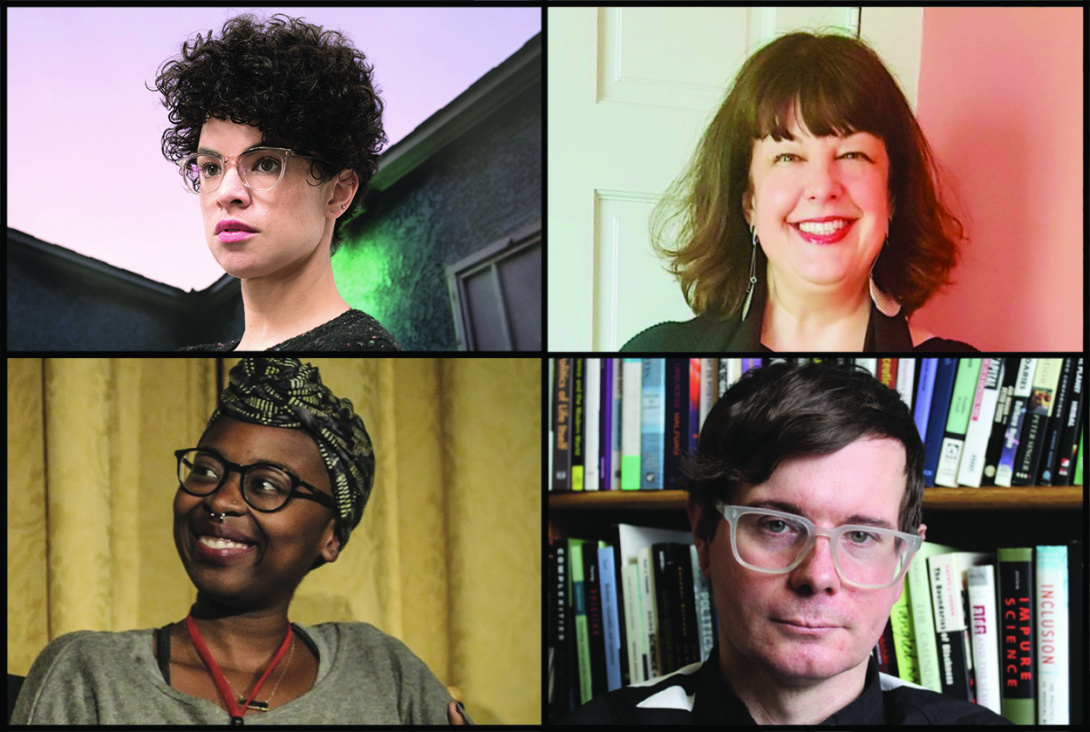
Courtesy of UC Santa Cruz Institute of Arts and Sciences.
Visualizing Abolition continues with Sadie Barnette, J. Kēhaulani Kauanui, Zoé Samudzi, and Eric Stanley.
About the Visualizing Abolition series:
This program is part of a series of virtual talks and events presented in conjunction with the exhibition Barring Freedom, co-organized by SJMA and UC Santa Cruz Institute of the Arts and Sciences (IAS). The online events feature artists, activists, scholars, and others united by their commitment to the vital struggle for prison abolition and are coordinated by the IAS in collaboration with Professor Gina Dent, feminist studies, UC Santa Cruz.
About the Speakers
Sadie Barnette earned her BFA from CalArts and her MFA from the University of California, San Diego. Her work has been exhibited throughout the United States and internationally and is in the permanent collections of museums such as LACMA, Berkeley Art Museum, the California African American Museum, Studio Museum in Harlem (where she was also Artist-in-Residence), Brooklyn Museum and the Guggenheim. She is the recipient of Art Matters and Artadia awards and has been featured in publications such as The New York Times, The Los Angeles Times, Artforum, and Vogue. She lives in Oakland, CA and is represented by Charlie James Gallery in Los Angeles and Jessica Silverman Gallery in San Francisco.
J. Kēhaulani Kauanui (Kanaka Maoli) is Professor of American Studies and affiliate faculty in Anthropology at Wesleyan University, where she teaches courses on Indigenous studies, critical race studies, settler colonial studies, and anarchist studies. Kauanui earned her doctorate in History of Consciousness and the University of California, Santa Cruz. She is the author of Hawaiian Blood: Colonialism and the Politics of Sovereignty and Indigeneity (Duke University Press 2008) and Paradoxes of Hawaiian Sovereignty: Land, Sex, and the Colonial Politics of State Nationalism (Duke University Press 2018). She is also the editor of Speaking of Indigenous Politics: Conversations with Activists, Scholars, and Tribal Leaders (University of Minnesota Press 2018), which is based on the radio program she produced and hosted for seven years, “Indigenous Politics: From Native New England and Beyond” that was widely syndicated through the Pacifica radio network. Kauanui currently serves as a co-producer for an anarchist politics show called, “Anarchy on Air,” a majority-POC show co-produced with a group of Wesleyan students, which builds on her earlier work on a related program, “Horizontal Power Hour.” She is one of the six original co-founders of the Native American and Indigenous Studies Association (NAISA), established in 2008. Kauanui also serves as an advisory board member of the U.S. Campaign for the Academic and Cultural Boycott of Israel.
Zoé Samudzi is a writer and doctoral candidate in Medical Sociology at the University of California, San Francisco. Her research engages colonial biomedicine, visuality, German colonialism, and the 1904-1908 Herero and Nama genocide in present-day Namibia. Her writing has appeared in The New Inquiry, The New Republic, Art in America, Hyperallergic, and Arts.Black, and she is a contributing writer at Jewish Currents. Along with William C. Anderson, she is the co-author of As Black as Resistance: Finding the Conditions for Our Liberation (AK Press).
Eric A. Stanley is an assistant professor in the Department of Gender and Women’s Studies at the University of California, Berkeley. They are the author of Atmospheres of Violence: Trans/ Queer Antagonism and the Ungovernable (forthcoming Duke UP) and the co-editor of Trap Door: Trans Cultural Production and the Politics of Visibility and Captive Genders: Trans Embodiment and the Prison Industrial Complex.
Visualizing Abolition is organized by UC Santa Cruz Institute of the Arts and Sciences in collaboration with San José Museum of Art and Mary Porter Sesnon Art Gallery. The series has been generously funded by the Nion McEvoy Family Trust, Ford Foundation, Future Justice Fund, Wanda Kownacki, Peter Coha, James L. Gunderson, Rowland and Pat Rebele, Porter College, UCSC Foundation, and annual donors to the Institute of the Arts and Sciences.
Partners include: Howard University School of Law, McEvoy Foundation for the Arts, Jessica Silverman Gallery, Indexical, The Humanities Institute, University Library, University Relations, Institute for Social Transformation, Eloise Pickard Smith Gallery, Porter College, the Center for Cultural Studies, the Center for Creative Ecologies, and Media and Society, Kresge College.